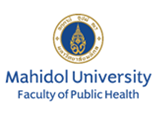[Event Report] Global Health Education Program (G-HEP) 2021-2022 – Fieldwork Trip Tokyo, Japan (August 7 – August 13, 2022)
date : 9/20/2022
Tags: Global Health
![[Event Report] Global Health Education Program (G-HEP) 2021-2022 – Fieldwork Trip Tokyo, Japan (August 7 – August 13, 2022)](https://hgpi.org/en/wp-content/uploads/sites/2/ghep2021-11-01.jpg)
Health and Global Policy Institute (HGPI) and the Faculty of Public Health at Mahidol University held a second fieldwork training in Japan as part of the jointly organized Global Health Education Program (G-HEP) 2021-2022, centered on, “solving health issues of urban migrants under the COVID-19 pandemic”.
Succeeding an enriching fieldwork training in Bangkok, Thailand this July, we welcomed six participants from Thailand, Myanmar, Nepal, and Bhutan and faculty from Mahidol University who joined together with program participants based in Japan.
The week-long fieldwork training in Japan that took place around Tokyo and Kanagawa aimed to identify unique health challenges of migrant urban populations in the country and to gain a deeper understanding of the background of the problems and work toward finding solutions through on-the-ground research. Throughout the week, participants met with and attended lectures from healthcare professionals, local NPOs/NGOs, and policy makers to help participants develop a cross-sectoral perspective of the issues and see how a collaborative effort is important for addressing and providing solutions for the problems.
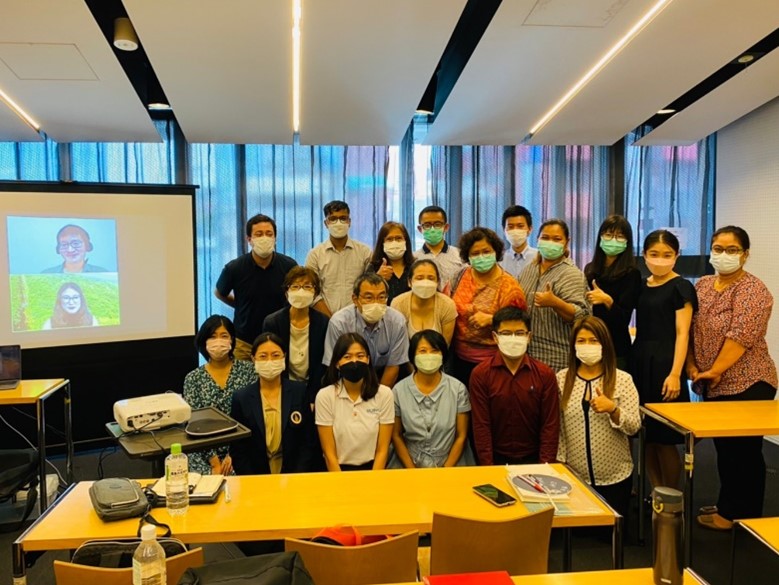 On healthcare issues, participants heard from Dr. Masami Fujita, Director, Global Networking,Bureau of International Cooperation, National Center for Global Health and Medicine, Japan on how their department in the hospital supports migrant communities and patients. He also spoke about his involvement in the Migrants’ Neighbor Network & Action Project (MINNA). Through surveying migrants living and working in Japan during the COVID-19 crisis, he shared what he learned about the challenges they faced, in accessing information, support, and the systems they need.
On healthcare issues, participants heard from Dr. Masami Fujita, Director, Global Networking,Bureau of International Cooperation, National Center for Global Health and Medicine, Japan on how their department in the hospital supports migrant communities and patients. He also spoke about his involvement in the Migrants’ Neighbor Network & Action Project (MINNA). Through surveying migrants living and working in Japan during the COVID-19 crisis, he shared what he learned about the challenges they faced, in accessing information, support, and the systems they need.
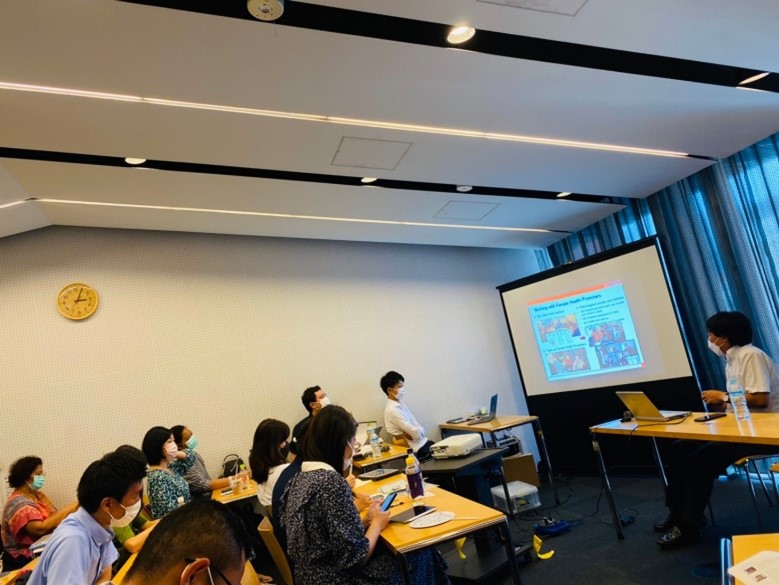
They also heard from Dr. Takashi Sawada, a physician at the Minatomachi Medical Center in Kawasaki, located in a predominately diverse migrant area. He talked about migrants’ health and health access and shared clinical best practices of how to reach and provide health care services based on his experiences in dealing with HIV/AIDS education, access, and care for this population. In addition, Dr. Tamotsu Nakasa a physician and a representative of the NPO SHARE (Services for the Health in Asian and African Regions) had a lively discussion based on his many years of experience working on medical access in other countries as a physician.
Participants were also able to get a more personal perspective from local NPOs/NGOs. Mr. Akihiro Okawa of NPO Solidarity Network with Migrants Japan (SMJ), Ms. Yoko Iwamoto of MIC Kanagawa, Ms. Yukako Takada ofCitizen’s Network for Global Activities(CINGA) , Ms. Hisano Niikura of Kalabaw no Kai, and Mr. Pop Prach Pongkijvorasin of CHARM, all shared about their grassroots activities and advocacy, working directly among migrant communities.
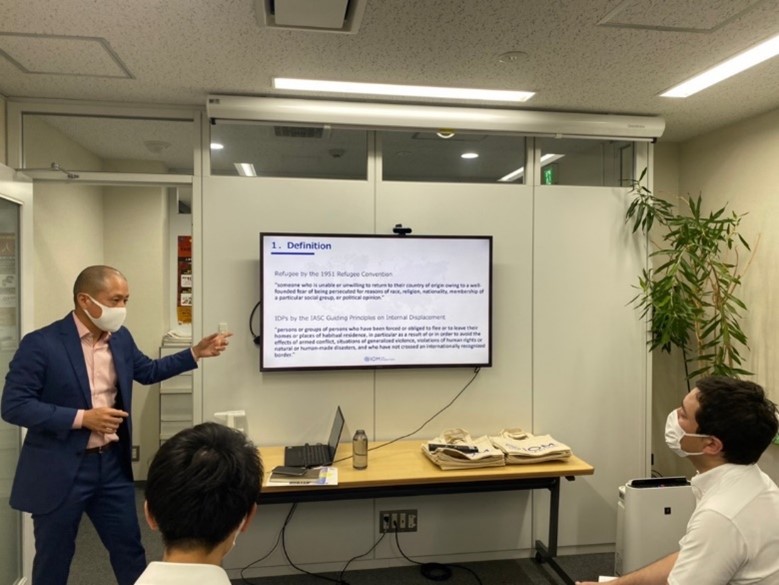 Furthermore, participants visited the International Organization for Migration (IOM) part of the United Nations (UN) system, where representatives Mr. Daihei Mochizuki along with Dr. Kaoru Takahashi and Dr. Aiko Kaji discussed the organization’s strategy and work that they do to uphold human rights for migrants, including a case study of Vietnam.
Furthermore, participants visited the International Organization for Migration (IOM) part of the United Nations (UN) system, where representatives Mr. Daihei Mochizuki along with Dr. Kaoru Takahashi and Dr. Aiko Kaji discussed the organization’s strategy and work that they do to uphold human rights for migrants, including a case study of Vietnam.
To better understand the policy agenda, participants visited the National Diet where they met with Dr. Hiroyuki Nakanishi, Officer for the Promotion of International Development of Healthcare, Medical Affairs Bureau, Ministry of Health, Labour and Welfare (MHLW) where he discussed about the current health policies Japan has for its migrant population.
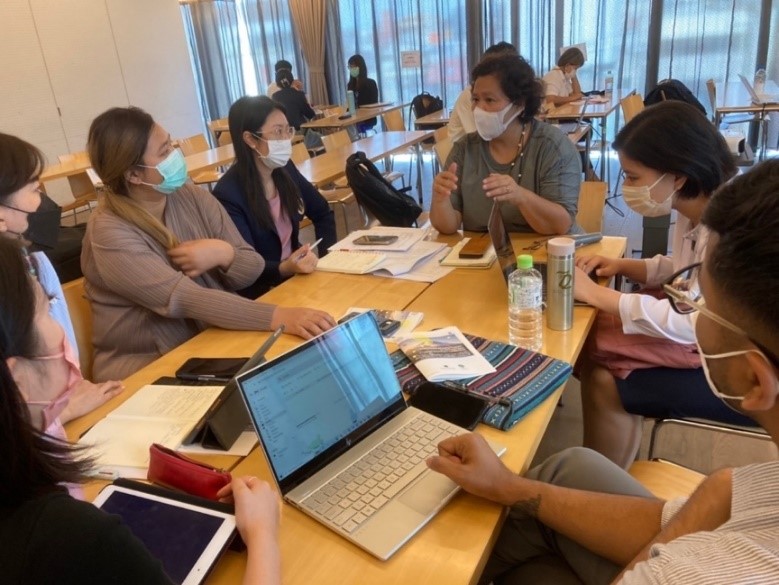 On the final day of the program, participants formed groups to reflect on what they experienced over the week. In groups they presented what they learned from the field and how this will apply to their research.
On the final day of the program, participants formed groups to reflect on what they experienced over the week. In groups they presented what they learned from the field and how this will apply to their research.
1) Thailand’s Health System and COVID-19
2) Japan’s Health System and COVID-19
3) Community Health
4) Health Technology
5) Global Health
6) Migrant Health
7) Policy Recommendations and Advocacy
8) Quantitative and Qualitative Research
■ Fieldworks
June 27 – July 2, 2022 Bangkok, Thailand
The Global Health Education Program (G-HEP) is a joint program organized by the Health and Global Policy Institute and Mahidol University, Faculty of Public Health in Thailand.
■About Mahidol University
Mahidol University is the number one university in Thailand for medical education and the first public health academic institution in Thailand.
Vision:
Be a leader in promoting population health through being a health literate faculty in ASEAN countries by 2021.
Mission:
1. To offer an outcome based public health education through being a health literate faculty.
2. To be visible as a leader in public health education, integrative and innovative research, professional academic services on the basis of good governance to promote health and longevity and the betterment of mankind.
Top Research & Recommendations Posts
- [Policy Recommendations] Achieving a Sustainable Society of Health and Longevity Through the Integration of Environment and Healthcare-Incorporating a Planetary Health Perspective into the 3rd Phase of The Healthcare Policy-(December 20, 2024)
- [Policy Recommendations] Integrating Climate and Health for a Sustainable Society: Incorporating a Planetary Health Perspective into Nationally Determined Contributions (NDCs)(December 9, 2024)
- [Research Report] Building a Mental Health Program for Children and Measuring its Effectiveness (June 16, 2022)
- [Policy Recommendations] Developing a National Health and Climate Strategy for Japan (June 26, 2024)
- [Research Report] The 2023 Public Opinion Survey on Satisfaction in Healthcare in Japan and Healthcare Applications of Generative AI (January 11, 2024)
- [Policy Recommendations] Policy Recommendations on Strengthening CKD Strategies for Workers: The Importance of Providing Early Detection, Intervention, and Support Through Screenings and Medical Visits (October 28, 2024)
- [Event Report] Planetary Health Expert Meeting Aiming for Sustainable Healthcare: Learning from the Impact of Environmental Pollution and Medical Waste During the Pandemic (February 16, 2024)
- [Policy Recommendations] Obesity Control Promotion Project 2023 “The Next Steps for Engaging and Cooperating with Patients, Citizens, and Communities for Implements of Obesity Control Measurements” (April 8, 2024)
- [Announcement] A Turning Point Towards Building Green Healthcare Systems (June 5, 2024)
- [Research Report] Survey of Japanese Physicians Regarding Climate Change and Health (December 3, 2023)
Featured Posts
-
2024-11-25
[Registration Open] (Webinar) The 130th HGPI Seminar “Marking a Decade of the Act on Medical Care for Patients With Intractable Diseases: Connecting Intractable Diseases and Society From the Perspective of a Media Professional and Family Member” (January 28, 2025)
![[Registration Open] (Webinar) The 130th HGPI Seminar “Marking a Decade of the Act on Medical Care for Patients With Intractable Diseases: Connecting Intractable Diseases and Society From the Perspective of a Media Professional and Family Member” (January 28, 2025)](https://hgpi.org/en/wp-content/uploads/sites/2/hs130-top_JPNENG-1.png)
-
2024-12-18
[Policy Recommendations] Policy Recommendations on Strengthening CKD Strategies for Workers: The Importance of Providing Early Detection, Intervention, and Support Through Screenings and Medical Visits (October 28, 2024)
![[Policy Recommendations] Policy Recommendations on Strengthening CKD Strategies for Workers: The Importance of Providing Early Detection, Intervention, and Support Through Screenings and Medical Visits (October 28, 2024)](https://hgpi.org/en/wp-content/uploads/sites/2/HGPI_20241023_FY2024CKD_eyecatch.jpg)
-
2024-12-20
[Policy Recommendations] Achieving a Sustainable Society of Health and Longevity Through the Integration of Environment and Healthcare-Incorporating a Planetary Health Perspective into the 3rd Phase of The Healthcare Policy-(December 20, 2024)
![[Policy Recommendations] Achieving a Sustainable Society of Health and Longevity Through the Integration of Environment and Healthcare-Incorporating a Planetary Health Perspective into the 3rd Phase of The Healthcare Policy-(December 20, 2024)](https://hgpi.org/en/wp-content/uploads/sites/2/e8a714648913193b03d5b6ede38c161e.png)
-
2024-12-25
[Registration Open] (Hybrid Format) Expert Meeting “Innovations Required to Achieve Precision Psychiatry” (January 22, 2025)
![[Registration Open] (Hybrid Format) Expert Meeting “Innovations Required to Achieve Precision Psychiatry” (January 22, 2025)](https://hgpi.org/en/wp-content/uploads/sites/2/mh-20250122-topr-1.png)
-
2024-12-27
[Activity Report] Second UN General Assembly High-Level Meeting on AMR (September 26, 2024)
![[Activity Report] Second UN General Assembly High-Level Meeting on AMR (September 26, 2024)](https://hgpi.org/en/wp-content/uploads/sites/2/4ED86AF7-49DE-465D-B59D-843B4F3C6102_1_201_a-scaled-1.jpeg)




